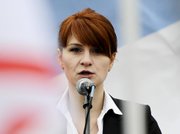MOSCOW -- When Maria Butina arrived in Moscow from Siberia in 2011 to launch a Russian version of the National Rifle Association, her shooting range coach said she didn't even know how to fire a weapon.
She learned fast, but her far-fetched bid to liberalize gun rights in Russia flamed out. By the time she arrived in Washington in 2014 to network with the NRA, she was peddling a Russian gun-rights movement that was already dead.
Fellow gun enthusiasts and arms industry officials described to The Associated Press the strange trajectory of a Russian gun lobby project that appeared doomed from the start -- with President Vladimir Putin among its many opponents.
U.S. court papers suggest the movement was a ruse, allowing Butina and influential patron Alexander Torshin to infiltrate the NRA and pursue covert Russian back channels to American conservatives as Donald Trump rose to power.
Butina, 29, has been jailed since July on charges of working as an undeclared foreign agent.
A federal judge in Washington on Monday blasted U.S. prosecutors and defense attorneys during a hearing in which the defense sought to have Butina set free on bail pending trial.
In ordering continued detention for Butina, U.S. District Judge Tanya Chutkan said Butina remained a serious flight risk.
Chutkan also imposed a gag order after slamming prosecutors for their mistaken claim in court filings that Butina traded sex for access, and her defense for repeated public statements that the judge said could bias potential jurors.
Butina has pleaded innocent after being indicted July 17 on charges of conspiracy to act and failing to register as an agent of a foreign government. Her defense said she was merely networking to develop relationships with Americans. She is jailed in Alexandria, Va.
The Russian government calls her a political prisoner. The NRA won't talk.
Analysts suggest Butina and Torshin started as freelancers, endeavoring to please the Kremlin by establishing a line of communication with the Republican party to ease crippling economic sanctions.
It's unclear when, and to what degree, Russian secret services got involved. But it's clear that no one in Russia tried to stop it.
Butina and Torshin -- a longtime senator who's now deputy governor of Russia's Central Bank -- suffered no punishment for openly championing gun rights, even though many in Russia's leadership see the idea as subversive.
"She was saying, 'I always thought if I was going to be in jail, I'd be in jail in Russia for advocating for gun rights, and now I'm in jail in America for advocating better U.S.-Russian relations. There's something kind of screwed up about that,'" said Robert Driscoll, Butina's U.S. attorney.
Guns are tightly restricted in Russia. Civilians can own only hunting rifles and smoothbore firearms and must undergo significant background checks for those. Allowing Russians to own handguns would be a lucrative opportunity for arms manufacturers -- a prospect that launched Butina's rise.
Billionaire transport magnate Konstantin Nikolayev and his wife Svetlana Nikolayeva, a sport shooter and CEO of Russian gun manufacturer ORSIS, brought Butina from her native Siberia to Moscow in 2011, according to a representative of the Russian arms industry. Nikolayeva, the representative said, tapped Butina to become the face of lobbying group Right to Bear Arms, modeled on the NRA.
Boris Pashchenko, the head of a shooting club in Moscow, worked closely with Butina in those early days. "I saw [Butina's group] at a shooting range when they first started organizing," he told the AP. "Butina had never fired a gun before; I was the one who taught her how."
Her lawyer said he couldn't comment on her shooting ability.
But fellow activists said she was an effective organizer, putting together well-financed rallies and uniting disparate gun-rights supporters. She studied the NRA's playbook, reciting its slogans and statistics.
Torshin, meanwhile, was taking advantage of a shift in U.S. politics, as many conservatives began viewing Putin's Russia -- nationalist, traditionalist, newly devout -- as a like-minded friend. He frequently visited the U.S. while in Russia's upper house of parliament from 2001 to 2015, bought a lifetime NRA membership and monitored the 2012 U.S. presidential election.
Torshin met Butina in 2011, and they began collaborating on legislation to liberalize pistol ownership, according to those involved.
But when Torshin submitted the bill in July 2012, it was torn apart.
Torshin's bill almost seemed designed to fail. Bills are rarely presented without tacit Kremlin approval, yet Putin himself said a few months earlier that "free movement of firearms will bring large chaos, and present great danger."
"They wanted to be a Russian NRA in terms of influence. But they knew you're never in Russia going to have a full-on Second Amendment arm-yourself-against-the-tyranny thing. That will get you thrown in jail," Butina's lawyer Driscoll told the AP.
The dream of Russian gun rights seemed over. In 2014, Butina resigned as leader of Right to Bear Arms. "After she left, I've not heard of them doing anything meaningful. It is a shadow of its former self," said Libertarian Party member and gun enthusiast Alexey Ovsiyenko.
Yet she and Torshin pressed on, twice hosting NRA delegations in Moscow. Visitors included Paul Erickson, a Republican operative who would become Butina's romantic partner in the U.S. and help her make inroads with the American right, according to U.S. prosecutors.
Information for this article was contributed by Matthew Bodner, Angela Charlton and Lisa Marie Pane of The Associated Press; and by Spencer S. Hsu of The Washington Post.
A Section on 09/11/2018
